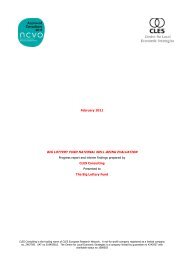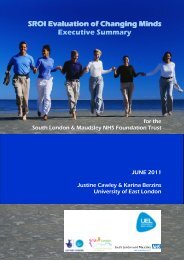Research Methods Handbook.pdf - CLES
Research Methods Handbook.pdf - CLES
Research Methods Handbook.pdf - CLES
You also want an ePaper? Increase the reach of your titles
YUMPU automatically turns print PDFs into web optimized ePapers that Google loves.
FEmpirical research<strong>Research</strong> conducted ‘in the field’, where data are gathered first hand.Case studies and surveys are examples of empirical research.EthnographyUses fieldwork to provide a descriptive study of human societies.EvaluationA form of research used to assess the value or effectiveness of socialcare interventions or programmes.Experimental groupThe group that receives the treatment is called the experimental groupand the other group is called the control group.Extraneous variablesThese are variables that influence the outcome of research, though theyare not the variables that are actually of interest. These variables areundesirable because they add error to an analysis.FacilitatorA facilitator is someone who skillfully helps a group of people understandtheir common objectives and assists them to plan to achievethem without taking a particular position in the discussion.FactorAnything that contributes causally to a result; “a number of factorsdetermined the outcome”.Feminist research<strong>Research</strong> into the relationship and understanding of the social constructionsof gender.FilterWhen only a section of the total sample are required to answer thequestion.Frequency distributionA visual display of numerical values ranging from the lowest to thehighest, showing the number of times (frequency) each value occurs.Frequency tablesA set of data, which provides a count of the number of occasions onwhich a particular answer/response has been given across all of thoserespondents who answered the question.GHIGaussian distributionA theoretical frequency distribution for a set of variable data, usuallyrepresented by a bell-shaped curve symmetrical about the mean. Statisticiansand mathematicians uniformly use the term “normal distribution”while physicists sometimes call it a Gaussian distribution.GeneralisableIn technical use, has a meaning of how results from a sample can begeneralised to a greater or lesser extent according to the outcome ofstatistical tests of significance.Hard dataPrecise data, like dates of birth or income levels, which can reasonablybe subjected to precise forms of analysis, such as statistical testing.HypothesisA theory or prediction made about the relationship between two variables.Independent variablesThe causal variable is known as the independent variable, and thevariable(s) where effects are under scrutiny are dependent variables.InferenceThe reasoning involved in drawing a conclusion or making a logicaljudgment.Inferential statisticsStatistics that allow a researcher to make inferences about whetherrelationships observed in a sample are likely to occur in the wider populationfrom which that sample was drawn.Informed consentThe process of obtaining voluntary participation of individuals in researchbased on a full understanding of the possible benefits and risks.Interval levelSee confidence levelInterval variableAn interval variable is similar to an ordinal variable, except that theintervals between the values of the interval variable are equally spaced.64 65









